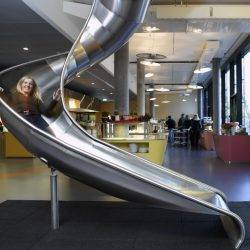October 5, 2017
The current approach to creative workplace design relies on faddish, ineffective ideas
 A new research paper published in the Journal of Management & Organization claims that while many organisations are focussed on creating workplaces that foster creativity, the results tend to ignore nuances about what makes people creative and instead focus on faddish ideas and playful, domestic design features to invoke ideas of creativity that may or may not be effective in practice. The study from Donatella De Paoli of the Department of Leadership and Organizational Behaviour, Norwegian Business School BI, Oslo and Arja Ropo of School of Management, University of Tampere concludes that organisations need to develop a more in depth understanding of creativity if they want to create creative workspaces.
A new research paper published in the Journal of Management & Organization claims that while many organisations are focussed on creating workplaces that foster creativity, the results tend to ignore nuances about what makes people creative and instead focus on faddish ideas and playful, domestic design features to invoke ideas of creativity that may or may not be effective in practice. The study from Donatella De Paoli of the Department of Leadership and Organizational Behaviour, Norwegian Business School BI, Oslo and Arja Ropo of School of Management, University of Tampere concludes that organisations need to develop a more in depth understanding of creativity if they want to create creative workspaces.










 The majority (83 percent) of workers view flexible working as an important benefit to them but two thirds (66 percent) believe that taking up flexible working halts progression at work. One of the reasons for this dichotomy suggests the results of the Hays UK Gender Diversity Report 2017, is because nearly a third (32 percent) of employees believe men will be viewed as less committed to their career if they take up shared parental leave, and women are less likely to be promoted after having children. While a majority (84 percent) of workers say it’s important that flexible working options are available to them in their workplace, many choose not to take any, and two-thirds think doing so will have a negative impact on their career. Women perceive it will have a negative impact, with over three-quarters (76 percent) reporting this concern and 65 percent of men. Interestingly, both men and women think flexible working options have helped improve the gender balance in senior roles, with 61 percent saying flexible working has improved the representation of women in senior positions, indicating that employers need to address and overturn the negative perception of flexible working and communicate its benefits.
The majority (83 percent) of workers view flexible working as an important benefit to them but two thirds (66 percent) believe that taking up flexible working halts progression at work. One of the reasons for this dichotomy suggests the results of the Hays UK Gender Diversity Report 2017, is because nearly a third (32 percent) of employees believe men will be viewed as less committed to their career if they take up shared parental leave, and women are less likely to be promoted after having children. While a majority (84 percent) of workers say it’s important that flexible working options are available to them in their workplace, many choose not to take any, and two-thirds think doing so will have a negative impact on their career. Women perceive it will have a negative impact, with over three-quarters (76 percent) reporting this concern and 65 percent of men. Interestingly, both men and women think flexible working options have helped improve the gender balance in senior roles, with 61 percent saying flexible working has improved the representation of women in senior positions, indicating that employers need to address and overturn the negative perception of flexible working and communicate its benefits.
 UK workers are still uncomfortable about having honest conversations at work, with nearly two thirds (61 percent) feel they keep an aspect of their lives hidden in the workplace. The research from Inclusive Employers found family difficulties (46 percent) was the most likely hidden issue at work, followed by mental health (31 percent). One in five also admitted they would hide their sexual orientation while at work. It also found a generational divide, with 67 percent of employees aged between 18 -24 years old keeping something secret compared to 55 percent of those over aged 55 years or over. The data, released to mark National Inclusion Week 2017, found this lack of openness can have negative impacts on workers and employers, with over a quarter of workers (26 percent) admitting they would feel less connected to their workplace if they hid an aspect of themselves and 18 percent saying their performance would suffer.
UK workers are still uncomfortable about having honest conversations at work, with nearly two thirds (61 percent) feel they keep an aspect of their lives hidden in the workplace. The research from Inclusive Employers found family difficulties (46 percent) was the most likely hidden issue at work, followed by mental health (31 percent). One in five also admitted they would hide their sexual orientation while at work. It also found a generational divide, with 67 percent of employees aged between 18 -24 years old keeping something secret compared to 55 percent of those over aged 55 years or over. The data, released to mark National Inclusion Week 2017, found this lack of openness can have negative impacts on workers and employers, with over a quarter of workers (26 percent) admitting they would feel less connected to their workplace if they hid an aspect of themselves and 18 percent saying their performance would suffer.





 Cyber risk is becoming increasingly common while the types of breaches are becoming more diverse, claims a new white paper by the audit and accounting expert BDO. For instance, ransomware is now the fifth most common type of malware; with the cost of freeing up computer systems from ransomware tripling since 2016. Yet organisations are continuing to spend up to four times more on insuring other company assets (e.g. property, equipment etc.) than on cyber insurance, despite an increasingly widespread belief that their cyber assets are in fact up to 14 percent more valuable. The report also finds that as cyber incidents increase, they become more difficult – and therefore more expensive – to defend. In the new cyber insurance white paper, BDO’s global cybersecurity leadership group stresses the importance of businesses gaining an understanding of their unique risk profiles in order to ensure the right cyber insurance for their needs. Cyber insurance: managing the risk does include some of the positive trends around cyber security – for example, both the level of Board involvement and investments in cybersecurity have increased significantly in the last 2-3 years.
Cyber risk is becoming increasingly common while the types of breaches are becoming more diverse, claims a new white paper by the audit and accounting expert BDO. For instance, ransomware is now the fifth most common type of malware; with the cost of freeing up computer systems from ransomware tripling since 2016. Yet organisations are continuing to spend up to four times more on insuring other company assets (e.g. property, equipment etc.) than on cyber insurance, despite an increasingly widespread belief that their cyber assets are in fact up to 14 percent more valuable. The report also finds that as cyber incidents increase, they become more difficult – and therefore more expensive – to defend. In the new cyber insurance white paper, BDO’s global cybersecurity leadership group stresses the importance of businesses gaining an understanding of their unique risk profiles in order to ensure the right cyber insurance for their needs. Cyber insurance: managing the risk does include some of the positive trends around cyber security – for example, both the level of Board involvement and investments in cybersecurity have increased significantly in the last 2-3 years.










October 2, 2017
Time to start a new culture to tackle stigma on mental wellbeing issues in the workplace
by Kate Cooper • Comment, Wellbeing
(more…)